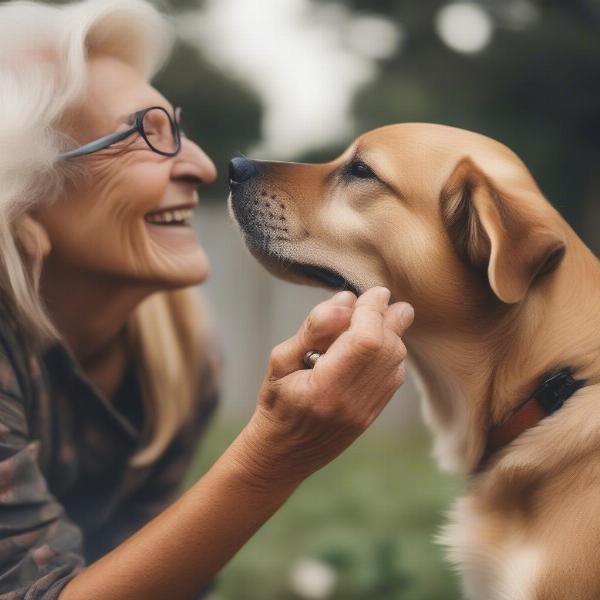Losing weight in a senior dog can be concerning, signaling potential underlying health issues. It’s crucial to understand the reasons behind this weight loss and take appropriate action. This guide provides practical advice and insights for pet owners dealing with this common problem in older dogs.
Understanding Weight Loss in Senior Dogs
As dogs age, their metabolism slows down, and their dietary needs change. However, unexplained weight loss should never be ignored. It can indicate a variety of health problems, ranging from dental issues affecting their ability to eat to more serious conditions like diabetes, kidney disease, or cancer. Sometimes, even subtle shifts in weight can be a crucial early warning sign.
Common Causes of Senior Dog Weight Loss
Several factors can contribute to weight loss in older dogs:
- Dental Problems: Painful teeth or gums can make chewing difficult, leading to decreased food intake.
- Gastrointestinal Issues: Conditions like inflammatory bowel disease or pancreatitis can interfere with nutrient absorption.
- Metabolic Disorders: Diseases such as diabetes, hyperthyroidism, and Cushing’s disease can cause weight loss despite increased appetite.
- Cancer: Various types of cancer can cause weight loss, often accompanied by other symptoms like lethargy and loss of appetite.
- Kidney Disease: Kidney failure can lead to nausea and loss of appetite, resulting in weight loss.
- Cognitive Decline: Senior dogs with cognitive dysfunction syndrome (CDS), similar to dementia in humans, may forget to eat.
What to Do if Your Senior Dog is Losing Weight
If you notice your senior dog losing weight, the first step is to consult your veterinarian. They will perform a thorough physical examination and may recommend further tests, such as blood work, urine analysis, or X-rays, to determine the underlying cause. senior dog losing weight but eating
Managing Weight Loss in Senior Dogs
Once the cause of weight loss is identified, your vet can recommend a tailored treatment plan. This may involve:
- Dietary Changes: Switching to a more easily digestible, calorie-dense food specifically formulated for senior dogs. food for dogs with no teeth
- Medication: Managing underlying medical conditions with appropriate medications.
- Dental Care: Addressing dental problems through professional cleaning or extractions.
- Supplements: Adding nutritional supplements to boost calorie intake and support overall health.
Tips for Encouraging a Senior Dog to Eat
 Senior Dog with Owner
Senior Dog with Owner
- Offer Small, Frequent Meals: Smaller meals are easier to digest and can be more appealing to a senior dog with a decreased appetite. dog breakfast
- Warm the Food: Gently warming the food can enhance its aroma and make it more palatable.
- Hand-Feeding: Hand-feeding can encourage a reluctant dog to eat, especially if they are experiencing pain or discomfort.
- Provide Fresh Water: Ensure your senior dog has access to fresh, clean water at all times.
- Make Mealtimes Enjoyable: Create a calm and relaxing environment during mealtimes.
Monitoring Your Senior Dog’s Weight
Regularly monitoring your senior dog’s weight is essential. why is my senior dog losing weight but still eating Use a pet scale or ask your veterinarian to weigh your dog during checkups. Keep a record of their weight and report any significant changes to your vet.
Conclusion
Unexplained weight loss in a senior dog is a serious concern that requires veterinary attention. Early diagnosis and appropriate management are crucial for ensuring your senior dog’s health and well-being. my senior dog is losing weight
Expert Insight from Dr. Emily Carter, DVM: “Don’t dismiss weight loss in your senior dog as simply ‘getting old.’ It’s often a sign of an underlying health problem that needs to be addressed.”
Expert Insight from Dr. Robert Miller, DVM: “Nutrition plays a vital role in managing senior dog health. A balanced diet tailored to their specific needs can significantly improve their quality of life.”
FAQ
- Why is my senior dog losing weight but still eating? This can be a sign of malabsorption or metabolic disorders. Consult your vet.
- What should I feed my senior dog who is losing weight? Your vet can recommend a calorie-dense, easily digestible diet.
- How often should I weigh my senior dog? Monthly weigh-ins are recommended to monitor any changes.
- Can dental problems cause weight loss in senior dogs? Yes, dental pain can make it difficult for them to eat.
- What are the signs of kidney disease in senior dogs? Increased thirst and urination, weight loss, and lethargy are common signs.
- What is cognitive dysfunction syndrome (CDS) in dogs? CDS is similar to dementia in humans and can affect a dog’s appetite.
- When should I be concerned about my senior dog’s weight loss? Any unexplained weight loss should be checked by a veterinarian.
ILM Dog is your trusted resource for expert advice on dog care and well-being. We offer guidance on various aspects of dog ownership, from breed selection and training to health and nutrition. Whether you’re a new dog owner or a seasoned expert, ILM Dog provides valuable insights to help you care for your canine companion. Contact us today for professional advice on your dog’s health and well-being! Email: [email protected], Phone: +44 20-3965-8624.